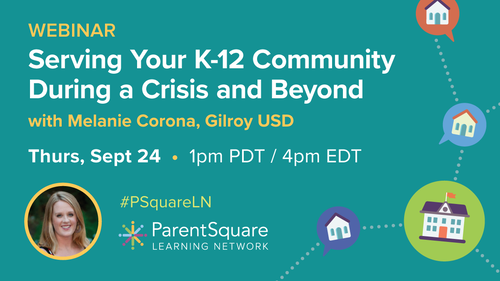This post originally appeared on our ParentSquare Learning Network blog on September 30, 2020.
Curated by Elizabeth Garcia at ParentSquare
Teaching and learning during a crisis presents lots of new challenges. Schools have always faced various crises like extreme weather conditions and active shooters, and now every school has had to navigate education during a pandemic. How can we run a classroom smoothly amidst these challenges? How do we keep students engaged during a crisis? What extra considerations should we take when teaching remotely? How can we use communication tools to create a community outside of the classroom?
On September 30th, we hosted a Twitter Chat to talk about school-home communication during a crisis such as COVID-19. We shared resources to help educators tackle new ways of teaching and create communication plans during a crisis.
Thank you to Rachelle Dene Poth, Director of Community for the ParentSquare Learning Network (@Rdene915), for moderating this Twitter Chat. Participants joined with the hashtag #PSquareLN. The full chat is available here, and you can view the highlights below!
Q1: What Are Some of the Crisis Situations You’ve Had To Communicate About With Families?
“Probably just the stress of returning to school. Also, as a coach, parents are concerned about their kids and how safe they will be. Just trying to be reassuring and listening matters.” — Craig Shapiro, @Shapiro_WTHS
“I personally have not had any crisis situations that I’ve had to communicate about with families yet. We’ve had to work out communication about possible exposures, quarantines, etc.” — Laura Steinbrink, @SteinbrinkLaura
“Changes to our classroom and school due to the pandemic” — Amy Moran, @amoran4
“Talking about events that happened in our school community also during the pandemic” — Rachelle Dene Poth, @Rdene915
“Students have complete melt downs and destroying property in the classroom. I have had students leave the property occasionally too” — Linda Edwards, @LindaEdwardsi
Q2: What Are Some Important Considerations for Communicating Between Home and School During a Crisis?
“Timely and concise communication should be guided by a purpose and should provide key details as well as links to additional resources” — Dr. Erik Youngman, @Erik_Youngman
“I think it is really important to listen when communicating with parents” — Linda Edwards, @LindaEdwardsi
“We really must know the message we are trying to convey. Keep things authentic and positive if possible. Also, be able to listen and add a calming voice to the situation. Never escalate a talk!” — Craig Shapiro, @Shapiro_WTHS
“Explain the situation and the remedy … And that we are all in this together all are contributors to the solution” — Andrews Olascoaga, @SporandiAndres
“Transparency! If you don’t communicate, someone else will do it for you – rumors go fast” — Paula Cassin, @paulacassin
“When communicating from school to home during a crisis, it is important: *to keep the message on point *to remember that communication goes both ways *transparency is vital *consistency is key *simplicity is best where possible” — Laura Steinbrink, @SteinbrinkLaura
“What families are dealing with, stress families have right now: we can find out through check ins, surveys, and good communication” — Amy Moran, @amoran4
Q3: What Must We Avoid When Communicating in the Midst of a Crisis?
“Negativity. Build what we need from our Ss* through celebration and positivity. Never underestimate the power of a positive phone call” — J Hamilton, @mrmakemathsense
Response to J: “That is so true, my reminder is “mindful of their circumstances” and that guides me” — Rachelle Dene Poth, @Rdene915
Response to J: “Love it! Makes me think of this https://psln.parentsquare.com/blog/how-to-engage-your-classroom-parents-with-positive-messages” — Paula Cassin, @paulacassin
* “Ss” stands for “students”
“FEAR. Personal opinions. JUST say NO to sharing more than is needed for the purpose. Keep it professional, but with empathy + kindness.” — Jillian DuBois, @JillDuBois22
“1. Taking it personally 2. Talking over others 3. Moving away from the problem 4. Lacking empathy 5. Forgetting it’s about kids” — Craig Shapiro, @Shapiro_WTHS
“Making things overly complicated in terms of language. Most ‘official statements’ are difficult to absorb. -Silence! -Believing you’re done because you posted (need to measure, track, see if anyone listening/responding, be read to respond)” — Paula Cassin, @paulacassin
“Being close minded, not listening, and being judgemental” — Amy Moran, @amoran4
“At all costs avoid blame. Listen and take time to reflect on what happened” — Linda Edwards, @LindaEdwardsi
Q4: What Resources Do You Have To Share To Help Others With Creating Their Communication Plans?
“10 tips to consider. https://docs.google.com/document/d/1PyBv3092cCPw9Qfo0DVQJO5LZGakowAAazKXTyfQc74/edit” — Craig Shapiro, @Shapiro_WTHS
“For Schools or Districts, I’m loving this – checklists, plans for COVID-19 crises https://www.engageequitably.org/” — Paula Cassin, @paulacassin
“Communication Plans should: *Exist *Have a clear theme or message *Be as up to date as possible *Be flexible *Be relevant *Keep the parents & community informed *Be consistent in how, when, & why information is delivered” — Laura Steinbrink, @SteinbrinkLaura
“Also Melanie from @GilroyUnified spoke about some of their school-home comms during various crises, with tips. Worth a listen! recording is here: https://attendee.gotowebinar.com/recording/9043055838284663553” — Paula Cassin, @paulacassin

Thank you to everyone for sharing your resources and advice on our Twitter Chat!







